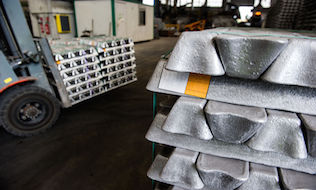

Unionized employees at a Quebec-based aluminum smelter are rejecting a proposed change that would move them to a two-tiered pension arrangement from a defined benefit plan.
The Syndicat des Métallos/United Steelworkers Local 9700 says employees at the Bécancour, Que., smelter “categorically reject a discriminatory, inferior pension plan for the next generation of workers.” The proposed change would keep defined benefit plans open for current employees and offer a defined contribution arrangement to all new workers.
Read: CUPE opposes two-tier pension plan in NB
The smelter is expecting a jump in new hires in the coming few years, according to a news release from the union that noted that similar attempts to institute two-tier plans have resulted in labour disruptions in Quebec. Workers at Ciment Lafarge and Resco Products Inc. both went on strike in opposition to proposed changes, according to the news release.
Read: Canada Post sticks to DC stance in issuing lockout notice to union
“The Steelworkers have been fighting against two-tier pension plans for several years. We are asking that legislation be finally introduced to prohibit such discrimination, as happened with wages in 2001,” said Clément Masse, president of Steelworkers Local 9700.
The Bécancour smelter is under joint ownership by Alcoa Corp., which holds a 74.9 per cent stake, and Rio Tinto, which holds the remaining 25.1 per cent. “We are working to reach a fair and competitive labour agreement that will position [Bécancour smelter] to better compete through all market cycles,” said Jim Beck, director of internal and external communications for Alcoa, in a statement.
“The various provisions in a new contract will be negotiated between the parties at the bargaining table.”
The current collective agreement expires Nov. 22.
Read: Union-led, multi-employer pension considering transition to target-benefit plan
In other news, workers at Brink’s Canada Ltd. in British Columbia have ratified a new four-year contract following concerns the company was moving to implement a defined contribution pension plan. The workers, who are members of Unifor, had cited the pension issue after they voted in favour of strike action recently.
“These negotiations presented a unique set of challenges in an industry that is undergoing fundamental change,” said Unifor national president Jerry Dias. “Nonetheless, the bargaining committee members were determined to make gains in wages and benefits for our members and they were successful in doing so.”
About 260 armoured car drivers and messengers, represented by Unifor Local 114, voted to ratify a new agreement that includes higher wages, enhanced benefits and the protection of the current defined benefit pension plan. Brink’s workers in Ontario voted to ratify similar agreements last week.
